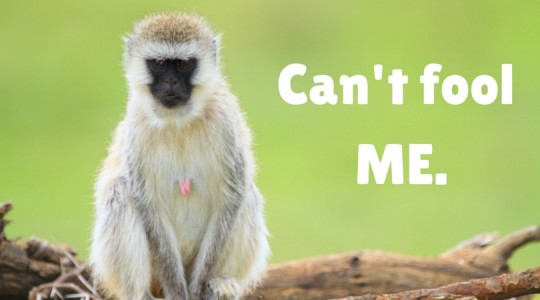Why Monkeys Are Smarter Shoppers Than Humans
[Guest article by John Carvalho]

Humans: Price Conveys Value
Neuromarketing readers no doubt remember a key truth of consumer behavior: our perception of goods is profoundly affected by the goods’ prices, even when those prices are completely arbitrary. Generally speaking, pricing functions as an indicator of product’ quality and efficacy.
For example, if you pay more for painkillers, you’ll perceive them as working better. If I pour you three glasses of the same $5 per bottle wine, but I tell you that one of the wines cost $45, you’ll report that you preferred it.
Further, this effect has two key features: price cues affect both our subjective, reported opinions and our brain chemistry. Brain areas associated with liking and desire are activated differentially with the “more expensive” wine too. It’s not just our expressed opinions, we actually experience a better product!
Why Are High-Priced Items Better?
Is this behavior rational, in the strictest sense of the word? Of course not. But, it is an innately human quirk, albeit one that we don’t quite completely understand. One hypothesis suggests that consumers have internalized some sort of innate “market intelligence” about value, supply and demand, and how these rules tend to work in human markets.
The second hypothesis? It’s nothing so specific. Researchers from Yale set out to learn more, and have published their results in the journal Frontiers in Psychology.
A Word about Monkeys
Animal research, especially with certain monkey species, serves as an efficient way to undertake a comparative analysis. Why? Because capuchin monkeys actually have many of the same decision biases and heuristics that humans do! They show evidence of endowment effects, loss aversion, and choice-induced preference reversals.
But of course, they’re not humans. So for research like this, where the hypothesis hinges on lessons learned in “human” markets, using monkeys trained to exchange tokens for food in a mock “economy” provided an interesting opportunity… Would monkeys, like humans, place a higher value more “expensive” food?
Monkeys Are Predictably Rational
The researchers found that, unlike humans, the monkeys did not prefer the expensive food. Once the monkeys were trained that certain treats cost more tokens and others less, they still showed no preference for the “expensive” food when given free access to both. Further experiments ensured that the monkeys had no innate taste preferences for each food, and also that the monkeys understood and encoded the pricing information.
Unlike humans, monkeys show no association between price and value.
But We Sell to Humans!
Apart from the amusing headline that this research ultimately led to, what gives? The experiments seem to show that pricing effects are, at some level, learned behavior, internalized by our experience interacting in the marketplace.
In other words, the human tendency to find more costly items more desirable and effective likely has its roots in some combination of actual experience and influence from parents, friends, etc.
Can these associations be un-trained? If I’m selling discount products, I need to communicate value in other ways – reviews, social proof, authority endorsements, and so on. You may not be able to change the overall price bias for your customers, but you can likely train them that your product is an exception.
And, of course, remember that overcoming this bias isn’t always necessary. Indeed, with the right pricing strategy versus your competition, you may be able to take advantage of it and earn higher margins at the same time.
